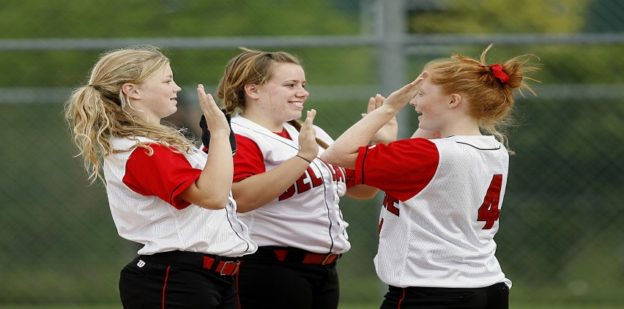

January 2, 2018 | Categories: Fitness
Have you ever dwelled on your poor performance from the company softball game over the office water cooler the next morning? Or, have you ever been so mad at yourself for slicing a golf ball that you pulled a “Happy Gilmore” and banged your clubs against the greens?
If you’ve ever put yourself out there as an athlete, chances are you’ve made a mistake at some point in your life. But turns out, that’s all part of the process. “Part of the athlete experience is learning how to cope with or respond to mistakes,” says Brandonn S. Harris, Ph.D., associate professor of Sport and Exercise Psychology at Georgia Southern University. “Great athletes are differentiated from good athletes by their ability to effectively cope with those types of experiences.”
Here are three ways to move on from athletic frustration and improve your skills.
Regroup during competition
“In sport psychology, we help athletes with how they can control the controllables, like their behaviors,” says Harris. If you find yourself down a few points or having a weak spot picked on by a ruthless competitor, use these tactics to stay present and keep your cool.
Take a breath. “We tend to think more clearly when we are at that right level of activation during competition,” says Harris. “Breathing is an effective technique athletes can use in between points to calm nerves and taking a deep breath can help trigger a routine if they have one.” This can help you prepare for the next play instead of dwelling on a mistake.
Use coping imagery. In preparing for competition, an athlete will usually picture himself or herself in challenging situations and use visualization to see themselves coming back from that adversity, says Harris. “These mental skills help an athlete prepare for that type of barrier so when it does happen, it’s no surprise and they’re mentally prepared to cope effectively with that,” he says. Visualization translates into improved performance because it trains the mind and body for those particular circumstances when they do occur, says Harris. So when the athlete is faced with that adversity in reality, they tend to respond more positively because the brain thinks it has experienced this before so it feels more confident that the athlete can execute the next steps effectively, he says.
Use key words. This technique can help you stay in the moment, suggests Deborah L. Feltz, Ph.D., a sport and exercise psychologist who specializes in self-efficacy at Michigan State University. Perhaps your mistake was starting out too fast during a race. If you notice that early on by monitoring your pace, have a positive, short word to say to yourself to regroup. In this instance, it could be, “pace, pace, pace,” as you run your next few miles. Change the word depending on the sport or athletic event you’re facing.
Refocus right away. “The time between points in a tennis match are very precious moments,” says Harris. Learning how to let go of an error and not keep those mistakes alive is something you have control over. “Learning cues—like using your breath and imagery—can help release mistakes and leave them in the past. Be focused on the here and now,” he says.
Concentrate on your next goal. “If you’re focusing on [what’s next] while you’re in competition, it’s difficult to focus on what the mistake was,” says Feltz.
Using positive self-talk, positive imagery and goal setting are building blocks that can help you focus during competition, as well as afterwards when you’re looking back on ways to improve, says Feltz.
Start a success strategy right away
It’s normal to dwell on a defeat for hours after a game or match, but if you’re still harping on your performance a few days or weeks later, it’s time to let that loss go.
“One of the things I find important to remember is that we don’t feel anxious or upset about things we don’t care about,” says Harris. In some ways it can be a good reminder that what we’re doing is really important, something we care about—and that’s a good thing. “We have a passion for what we are doing. It’s OK to acknowledge that we wish we did something differently in that performance. But the idea is to not harp on that for too long. Acknowledge it and let that piece go,” says Harris. How long someone dwells on an issue varies from athlete to athlete. A shortstop might need to let go of their mistake from the day before faster if they have a baseball game the following day, while a quarterback often has a week in between games to regroup.
“Set up goals for what you want to do,” says Feltz. Use that time in between games or matches to help organize your practice for improvement and success next time, she says. “It’s important to look forward so you’re not kicking yourself for something you can’t control because it’s already done.”
Try meditation
You need to be very focused for execution during your sport and having a meditation practice can help athletes be more effective in their sports, says Feltz.
Meditation is important for keeping a realistic perspective on your sport and sport-related experiences, says Harris. Using mindfulness training can help you stay focused on the present and find ways to cope effectively with mistakes and challenging situations.
It’s also important to keep your athletic life in perspective with your whole life. “The idea that your self-worth is tied to your performance can be very destructive type of thinking,” says Harris. “Be realistic that there’s more to you than being an athlete and more to you than your performance. What you’re doing is important and you want to do well, but there’s more to who you are. This [mindset] can help alleviate the disappointment of a poor performance.”
Read the full article of How to Lose without Losing Your Cool on Headspace.
Leave a Reply